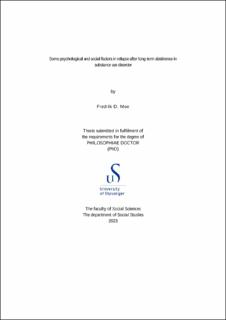| dc.contributor.advisor | Bjørnestad, Jone | |
| dc.contributor.advisor | Moltu, Christian | |
| dc.contributor.advisor | Erga, Aleksander | |
| dc.contributor.author | Moe, Fredrik D. | |
| dc.date.accessioned | 2023-05-16T11:35:21Z | |
| dc.date.available | 2023-05-16T11:35:21Z | |
| dc.date.issued | 2023 | |
| dc.identifier.citation | Some psychological and social factors in relapse after long-term abstinence in substance use disorder by Fredrik D. Moe, Stavanger : University of Stavanger, 2023 (PhD thesis UiS, no. 700) | en_US |
| dc.identifier.isbn | 978-82-8439-165-6 | |
| dc.identifier.issn | 1890-1387 | |
| dc.identifier.uri | https://hdl.handle.net/11250/3068189 | |
| dc.description.abstract | Background
Knowledge about psychological and social factors in SUD recovery is scarce. There is even less comprehension of the factors associated with relapse for people in long-term recovery.
Objective
The objective of this thesis has been to investigate psychological and social factors associated with relapse after long-term abstinence. Specifically, it investigates psychological functioning and recovery over five years, and drug-free friendships and alcohol and substance use trajectories over four years. However, to achieve this aim, it was necessary to conduct a systematic review of relapse operationalisations after short-term and long-term abstinence, and remission, recovery, slip and lapse. This review provided a foundation for investigating relapse after long-term abstinence, as a better overview of previous research made it possible to operationalise the relapse concept in accordance with prior research.
Method and hypotheses
The systematic review was conducted following the PRISMA guidelines and publishing a PROSPERO protocol. Next, two quantitative analyses were conducted using statistical modelling. These studies are based on the Stayer study (n = 208) that contains measures on psychological and social factors collected annually across five years. We postulated that improvement in psychological functioning would increase the chance of recovery and reduce the risk of relapse across five years. In the third study, we hypothesised that having drug-free friendships would reduce alcohol and substance use levels. Furthermore, we postulated that debut age and gender were associated with alcohol and substance use trajectories across four years.
Results
In the systematic review (paper I), we found that there was neither consensus on relapse operationalisations nor differentiation between early and late relapse. We found that there were significantly more short-term than long-term studies.
In paper II, we found that improvement in psychological functioning aids recovery across five years. However, we found an annual decline in recovery scores, indicating that improvement in psychological functioning may be important to obtain recovery, but not sufficient to maintain it.
In paper III, we found that alcohol and substance use trajectories were mostly stable across four years, i.e. from first to fifth follow-up. We found that neither having drug-free friendships nor gender and debut age seemed to influence alcohol and substance use trajectories across four years.
Conclusions
In our review, we conclude that there is less knowledge about relapse after long-term abstinence, i.e. relapses happening after two years of recovery. The SUD research field appears not to differentiate between early and late relapse. Moreover, there are variations in the operationalisations of relapse, as they seem to differ in degrees of detail when representing relapse. Operationalisations of remission and recovery appear to favour abstinence over other functional measures, which is contrary to the recovery literature. Relapse seems to be regarded as a static phenomenon rather than dynamic and as an endpoint and not a change point. The variation in relapse operationalisations may make it difficult to aggregate study results and build on previous research. Theknowledge base on relapse prevention after two years of recovery is scarce, which may lead to suboptimal long-term treatment.
In paper II, we conclude that improvement in psychological functioning is important for obtaining recovery, but insufficient to maintain recovery consistently across five years. Hence, there is a need for other improvements in personal and social functioning to increase the chance of obtaining and maintaining recovery.
In paper III, we discuss discrepancies between our results and previous research. Contrary to previous research, drug-free relationships were found to have little influence on reducing alcohol and drug use, while debut age and gender were unrelated to use trajectories. We conclude that research and theory on social determinants and social recovery indicate that there exists such a relationship and that there are good reasons to believe that positive support from others and a positive environment aid recovery. Consequently, our findings warrant more research. | en_US |
| dc.language.iso | eng | en_US |
| dc.publisher | University of Stavanger, Norway | en_US |
| dc.relation.ispartofseries | PhD thesis UiS; | |
| dc.relation.ispartofseries | ;700 | |
| dc.relation.haspart | Paper 1: Moe, F.D., Moltu, C., McKay, J.R., Nesvåg, S. & Bjørnestad, J. (2022) Is the relapse concept in studies of SUD “A one size fits all” concept? A systematic review of relapse operationalisations. Drug and Alcohol Review, 41(4), 743-758 | en_US |
| dc.relation.haspart | Paper 2: The predicting role of psychological functioning in remission and recovery in substance use disorder across 5 years. In review. This paper is not included in the institutional repository due to its publication status. | en_US |
| dc.relation.haspart | Paper 3: Changes in the trajectories of drug-free friendships and substance use among a cohort of individuals with multiple substance use disorders. In review. This paper is not included in the institutional repository due to its publication status. | en_US |
| dc.rights | Copyright the author | |
| dc.subject | alkoholmisbruk | en_US |
| dc.subject | rusmisbruk | en_US |
| dc.subject | substance use disorder | en_US |
| dc.subject | recovery | en_US |
| dc.title | Some psychological and social factors in relapse after long-term abstinence in substance use disorder | en_US |
| dc.type | Doctoral thesis | en_US |
| dc.rights.holder | ©2023 Fredrik D. Moe | en_US |
| dc.subject.nsi | VDP::Samfunnsvitenskap: 200::Sosialt arbeid: 360 | en_US |
| dc.subject.keyword | sosialt arbeid | |
